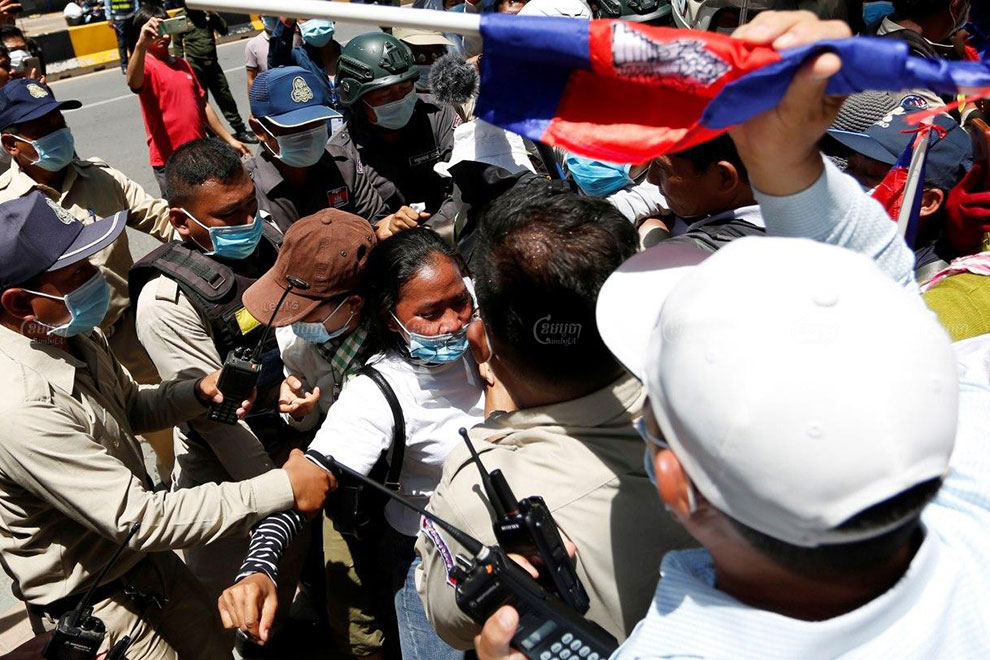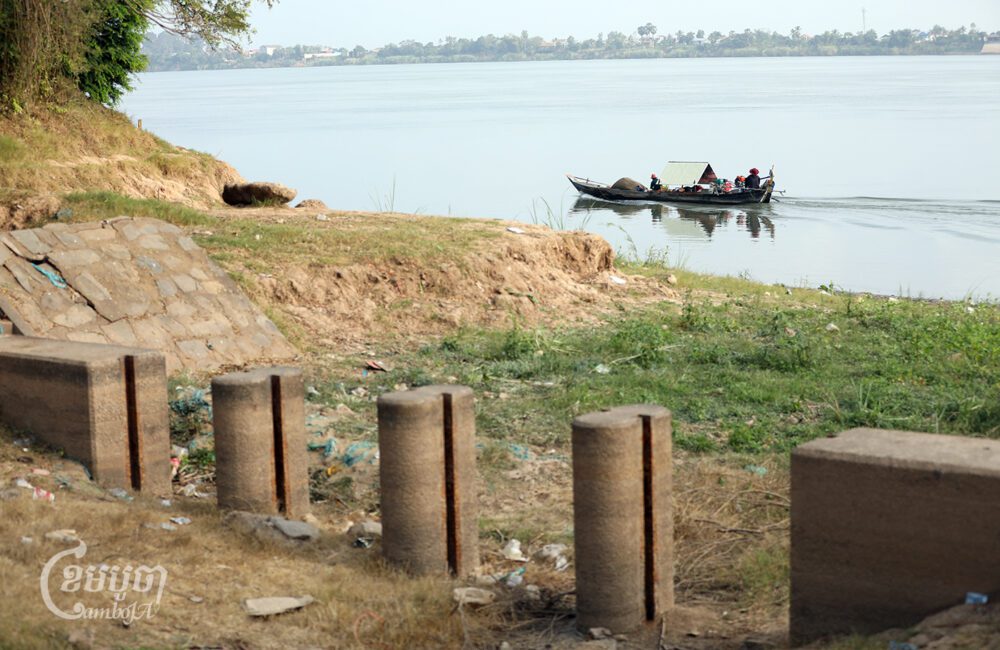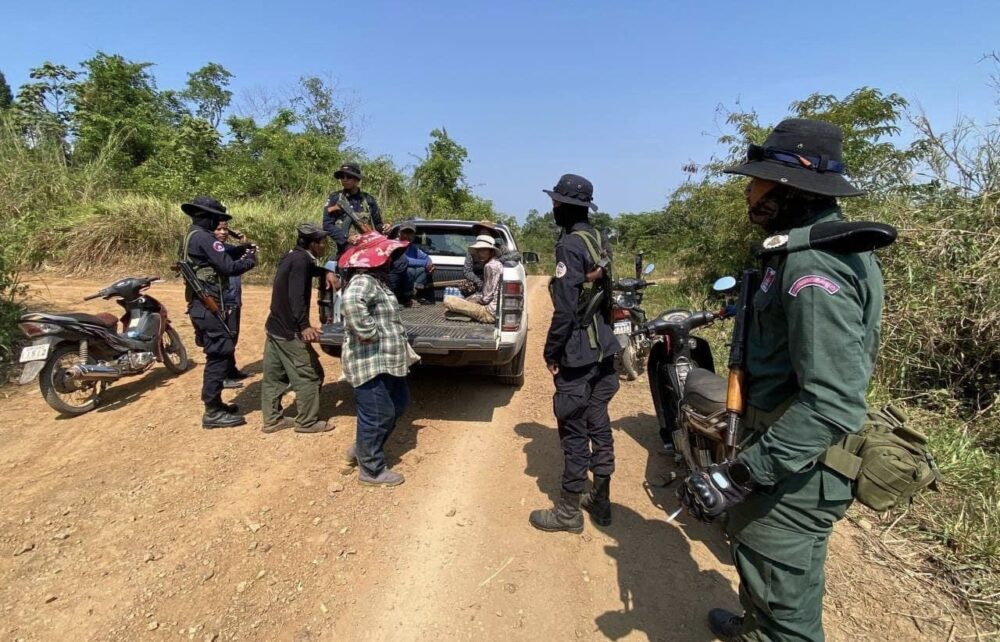Eight monks from Battambang province were prevented from joining activists and supporters in a protest in Phnom Penh on August 5 to demand the release of prominent union leader Rong Chhun, who was jailed last week over comments he made allegedly distorting information on Cambodia-Vietnam border issues.
After arriving in Phnom Penh on August 4, the monks were called to a meeting at Botum pagoda and were forced to return their pagoda after admitting their mistake and promising not to attend demonstrations in support of Chhun.
In the protest that went ahead without the monks on the morning of August 5, authorities and security guards clashed with some 20 protesters as they marched along Sihanouk Boulevard on their way to the Court of Appeal, causing a few to suffer slight injuries.
Venerable Khim Sorn, chief of the secretariat of the Mahanikaya sect and Phnom Penh’s chief monk said August 5 that the Supreme Patriarchs of both of Cambodia’s sects had previously banned monks from participating in any demonstrations that cause public disorder or are deemed inappropriate for the monkhood.
“It does not mean I am the only one who banned them,” he said. “Both supreme patriarchs had announced plans to prohibit monks from joining the demonstrations.”
He said that the rules of Buddhism say it is an offense for monks to be outspoken or physically involved in demonstrations.
“When we [monks] go to participate in the demonstration it will make us forget ourselves as a monkhood and make us become angry like a common person that is seeking inappropriate activities,” Venerable Sorn said.
Venerable Khim Sorn said he had invited the eight monks to a meeting at Botum pagoda on August 4 after he had been told by monks at a separate pagoda where the group originally planned to stay that they had met with a support of Rong Chhun’s at a coffee shop that evening.
In the meeting, the monk chief said he discussed the monks’ intentions in Phnom Penh, then sent them home to in Battambang province at 1pm the following day.
“We allowed them to return and I have advised the provincial monk chief to educate them that they have made a mistake,” Venerable Khim Sorn said.
He added that he had confiscated the monks’ phones because one of them had made an audio recording during the meeting after he had specifically asked them not to.
“When I finished speaking, there was a recording . . .so I seized all the phones and we will return back to them later,” Venerable Khim Sorn said.
The monks could not reach for comment.
Venerable Chen Sochan, who lives at the same pagoda in Battambang as the eight monks, said August 5 that monk officials had restricted their freedoms by banning social activities.
He said the eight monks had travelled to Phnom Penh on August 4, planning to stay the night at Wat Than in Chamkarmon district. At around 10:30pm, monk officials called them to Botum pagoda asking for information about the group’s discussion with Chhun’s supporters.
“Those monks were prevented from participating in calling for the release of Rong Chhun because they were detained at Botum pagoda,” he said.
“I think they are restricting monk’s freedoms because they do not want to break the law on religion as well as not to violate Cambodia’s constitutional law,” Venerable Chen Sochan added.
Youth activist Hun Vannak, who attended the protest in Phnom Penh on August 5, confirmed that he had discussed the demonstration with the monks from Battambang prior to the event.
“They [the monk chiefs] have restricted all freedoms,” he said. “Even monks can’t join in social activities.”
In 2007, The Cambodia Daily reported that former Supreme Patriarch Non Nget announced a ban on monks joining in demonstrations, saying peaceful protests by monks could cause “disorder.”
At the time, Constitutional Council member Son Soubert said the ban was unconstitutional.
“There is no law banning people—or monks—from protesting,” he said, adding that the ban “violates the constitutional law of Cambodia” and calling on the government to explain its position.
Ministry of Cults and Religion spokesman Seng Somony declined to comment on August 5.
On August 5, the march began as planned with about 20 demonstrators heading toward the Court of Appeal, chanting for Chhun to be released from jail. The outspoken union leader has been held in pre-trial detention since he was charged on August 1 with incitement over comments he made in an interview with Radio Free Asia alleging that Vietnamese soldiers have invaded Cambodian territory and expelled villagers from their land in Tboung Khmum province.
However, they were met by about 20 security officials on Preah Sihanouk Boulevard in Prampi Makara district, resulting in tussles between protesters and authorities that left several with injuries and forced Chhun’s supporters to disperse under threat of legal action.
So Meta, a 31-year-old who hurt her leg during the interaction, condemned the authorities’ use of violence, especially against women.
“I think that it is a serious violation of human rights because we are women,” she said. “What we are doing is nonviolent but authorities come to scuffle and kick us, so I strongly condemn those activities.”
Chea Kunthin, who was also slightly injured and briefly fell unconscious, called on national organizations and the international community to intervene to stop the use of violence.
“They are getting a salary from citizens but they have used their power to beat up villagers,” she said.
Phnom Penh City Hall spokesman Met Measpheakdey emphasized that the current demonstrations did not receive permission from Phnom Penh authorities.
“Because those activities are [illegal] that’s why our authorities have to maintain security and public order,” he said.
When asked if security guards had used violence against protesters, he said, “I have heard those accusations,” before declining to comment further.
Chak Sopheap, executive director at the Cambodia Center for Human Rights said that the government should fulfil its legal obligation to protect protesters instead of instigating violence.
“The incidents appeared to show the Cambodian authorities’ disregard for protesters’ rights and safety,” she said, adding that the government is reminded that law enforcement officials must seek to de-escalate any situations that may result in violence.
“Moreover, any use of force must be minimal and proportionate to the circumstances, and authorities that do use force must be held accountable for their actions,” Sopheap said.
In the last few days Cambodian authorities have repeatedly impeded the right to freedom of peaceful assembly, she said, as protesters demanding Chhun’s release have been interfered with, prevented from gathering and threatened with legal action.
“It should be noted that this unfortunate chain of events would have been prevented had Mr. Rong Chhun’s legitimate right to freedom of expression been respected. His arrest forms part of a broader pattern of systemic silencing of dissenting or critical voices by the RGC,” she said.








